New cars coming in 2024: upcoming cars to get excited about
2025 is just a few months away, but there’s still a handful of exciting new cars coming our way before the year is up
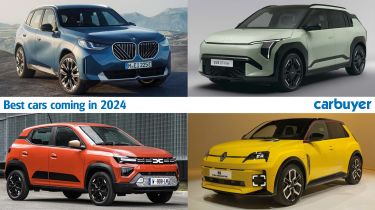
With the summer well and truly behind us and eyes already looking ahead to 2025, there's still an exciting lineup of cars arriving before we flip our calendars.
From superminis to SUVs, we’ve seen a mixture of new cars of all shapes and sizes in 2024. Many car makers have turned their attention to the affordable end of the EV market, with a slew of new zero-emission superminis announced for 2024. At the other end of the spectrum, premium manufacturers have fully embraced electric propulsion, with more and more new luxury cars using motors and batteries in place of traditional combustion engines.
 The top 10 best sports cars in 2025
The top 10 best sports cars in 2025
However, petrol-engined cars remain the most popular on sale in 2024, and buyers won’t be short on choice for new models. Despite declining sales, there are even a few new diesel models on the way this year, so motorway drivers have something to look forward to, as well. For many drivers, hybrids offer the ideal compromise between electric and combustion power and their market share continues to grow – a trend that’s expected to continue as a host of new models with longer electric driving ranges arrive this year and into the next.
We’ve compiled a list of the top new cars to keep an eye out for this year, separated into four categories – small cars, family cars, premium cars and performance cars. There’s something for everyone, so read on to find out which new car you should be looking out for!
Small cars
Despite large SUVs being all the rage, we saw plenty of small cars appear last year – and 2024 is shaping up to continue that trend. If you’re looking to get behind the wheel of a new compact run-around next year, here are our top picks coming soon.
Citroen e-C3
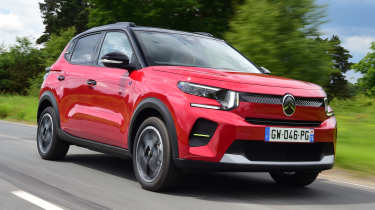
The new Citroen e-C3 has just gone on sale in the UK as one of the most affordable new EVs you can buy. With a starting price of under £22,000, it’s set to shake up the electric car market and will no doubt encourage more urban drivers to take the plunge on an EV.
It’s up against a strong selection of budget-friendly EVs, such as the MG4 and the BYD Dolphin, but it’s already proven itself to be a strong contender – so much so, that it was crowned Britain’s best new car in 2024 by our sister title Auto Express. We’re big fans of the e-C3, too, thanks to its spacious interior, comfortable ride and game-changing price tag.
Despite the low starting price, the e-C3 still manages up to 199 miles of range from its 44kWh battery and can be topped up via a 100kW rapid charger. An even cheaper model with a 124-mile range will appear at a later date, solidifying the e-C3’s place as one of the most affordable new electric superminis. Petrol and mild hybrid C3 models are also offered for those not ready to commit to fully electric driving; a starting price of under £18,000 makes the C3 one of the cheapest cars on sale.
With the first cars arriving in the UK later this year, we’d be excited if we’d placed an order.
Renault 5
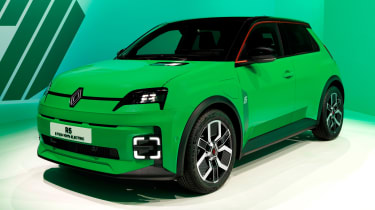
Fully revealed in February this year, the new Renault 5 revives a historic nameplate with the latest EV tech and a charming retro-inspired design. It’ll serve as another affordable small EV option when it goes on sale this autumn, with a predicted starting price of around £25,000.
Just as the original Renault 5 shook up the hatchback market over fifty years ago, the modern version is destined to do the same. Renault hopes that it’ll encourage more people to make the switch to electric driving, thanks to its affordable price tag, respectable range and roomy cabin. We’re yet to drive the new 5, but as it shares much of its running gear with other Renault Group models – the Clio, Captur and even the Dacia Duster – we expect that it’ll be an equally enjoyable steer.
If the Renault 5’s choice of 121bhp and 148bhp motors doesn’t sound punchy enough for you, perhaps the new Alpine A290 will get your heart racing. The French performance car brand will release its hotted-up version of the Renault 5 later this year, with up to 217bhp and a 0-62mph time of 6.4 seconds. It adds a dose of muscle to the Renault’s cute styling, with a lick of bright blue paint for good measure.
Fiat Grande Panda
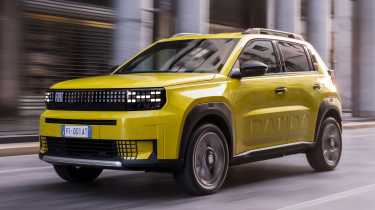
Fiat will also be throwing its hat in the affordable EV ring in 2024 with this, the new Grande Panda. Much like the Renault 5, the Grande Panda will lean on its iconic predecessor for styling inspiration – it features a shamelessly boxy design with various nods to the original 1980s hatchback.
Under the skin, it’ll use the same electric guts as the Citroen e-C3, meaning you’ll get a 44kWh battery and a front-mounted motor with 111bhp. In the Grande Panda, the system will deliver up to 199 miles of range which will be more than enough for its intended customers – city dwellers. A mild hybrid model has also been confirmed, using the same 1.2-litre three-cylinder as the forthcoming Citroen C3, although there’s no word yet on an even cheaper pure-petrol version.
European prices will start from around €25,000 for the EV – or roughly £21,000 – putting it on par with the e-C3. The mild hybrid will be even more affordable, costing from €19,000 (around £16,000).
Dacia Duster
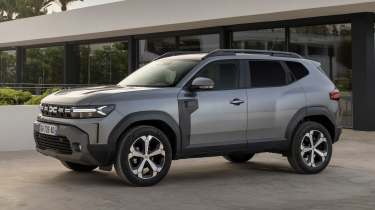
Fans of Dacia’s small SUV will be delighted to know that an all-new Duster has just gone on sale in the UK. Building upon the success of the second-generation model, the new Duster provides more interior space and a chiselled new look for a wallet-friendly price – entry-level models cost from under £19,000, despite a much-welcomed push upmarket in terms of design, tech and quality.
New to the lineup is a choice of hybrid options, giving certain Duster models limited electric-only driving capabilities. There’s a host of new optional off-roading features too, with different selectable driving modes: Auto, Snow, Mud/Sand, Off-Road and Eco. Perhaps the most interesting new feature to look out for is the ‘Sleep Pack’, an optional fold-out double bed that fits in the back – perfect for a trip into the wilderness!
Dacia Spring
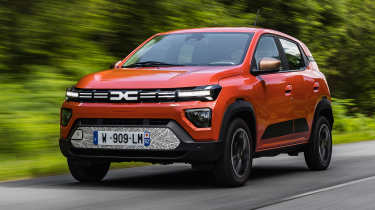
‘Budget’ and ‘electric’ are two words that don’t often cross paths in the new-car world, but 2024 appears to be the year where things are changing. The aforementioned Citroen e-C3 looks to be a bargain at around £22,000, but the new Dacia Spring undercuts this further with a starting price of just £15,000. UK buyers can place an order now, with the first cars coming later in the year.
Much like other cars from Dacia, simplicity is the Spring’s selling point. The interior is basic and the technology isn’t groundbreaking, but these compromises are what keep the price so astoundingly low for an EV. Its electric motor produces just 44bhp, which should be just enough for pootling around town, while a top speed of 78mph adds far more usability over the cheaper but much slower and far less practical Citroen Ami.
The battery is relatively small at 27kWh, but it has enough juice to give the Spring a 190-mile range if you stick to slow, urban driving. The small battery also improves charging time – expect a five-hour 0-100% charge time from a standard 7kWh home wall box.
Family cars
Buyers who need something larger than a typical supermini are going to be spoiled for choice in 2024, with a raft of new mid-size family cars hitting the road. From what we’ve seen, there will be more options to choose from than ever before, satisfying a range of budgets and body styles.
Skoda Elroq

Skoda seems to have a firm grasp on the family car segment at the moment, with a range of great-value models that deliver just what families need. With four SUVs already on sale, the Czech brand will carve out another niche later this year when it reveals the Skoda Elroq, its fifth SUV and second all-electric model.
Taking design inspiration from 2022’s Skoda Vision 7S concept, the Elroq will introduce a fresh visual identity for Skoda. Sitting between the Karoq and Enyaq in terms of size, the all-new EV will ride on the same platform as the latter, with a five-seat interior layout and a dashboard layout similar to the new Skoda Superb. There will be a range of battery sizes and motor configurations to pick from, ranging from the budget-focused ‘50’ up to the four-wheel drive ‘85x’.
The Elroq is scheduled to be unveiled later this year, when we’ll learn more about its technical specifications and pricing. As the Enyaq costs from around £37,000, we could see a starting price of closer to £30,000 when the Elroq goes on sale early next year.
Kia EV3
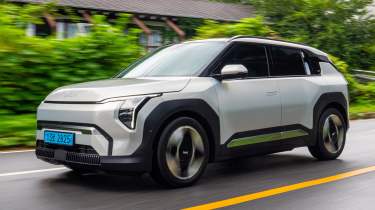
Kia has expanded its electric lineup further this year with the introduction of the EV3, a mid-size SUV that we saw in concept car form last year. The all-new EV wears the South Korean brand’s latest design language, with chunky proportions and a shorter wheelbase than the Kia EV6, and packs its latest-generation interior.
The EV3 is based on the same E-GMP platform used by Kia and Hyundai’s latest electric offerings, from the Ioniq 6 to the EV9 SUV, and is currently only available in a front-wheel drive, single-motor configuration – pricier dual-motor variants are expected to follow next year. Given the success of the recent electric models from Kia and Hyundai, we have no doubt that the EV3 will pose a threat to the mid-size SUV segment when the first examples hit our roads.
MINI Countryman
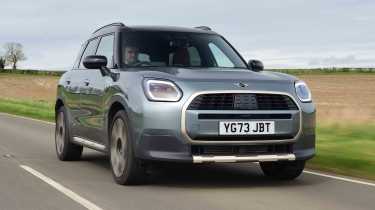
MINI’s popular mid-size family car, the Countryman, has entered its third generation this year, with the option of mild-hybrid or fully-electric models. Revealed in September 2023, the new Countryman trades the old model’s round styling for a squarer, more chiselled look, but retains its predecessor’s lifted hatchback proportions.
Starting from £28,500, the Countryman was initially only offered as a petrol model, before a pricier pure-electric model arrived later in the year. There are a variety of petrol engine options to choose from, ranging from the base 168bhp Countryman C up to the top-spec, 296bhp JCW ALL4. Electric models share much of their componentry with the BMW iX1, featuring a 65kWh battery in either 201bhp single-motor guise, or 309bhp dual-motor SE spec.
Inside is much the same as the new MINI Cooper, with the 9.4-inch circular infotainment display and knitted textiles carried over from the small hatchback. Having driven the new Countryman on UK roads, we can attest to the car’s comfort and improved interior space over the outgoing model.
Peugeot 3008
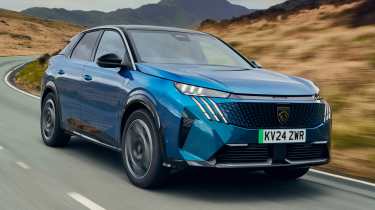
The 3008 is one of Peugeot’s most popular cars, but that hasn’t stopped the brand going for gold with its replacement. Just arriving in showrooms now, the third-generation Peugeot 3008 has been given a more athletic look, with a coupé-like roofline that takes its cues from the French firm’s handsome 408. Standout styling cues include Peugeot’s trademark three-claw LED running light signature at the front and rear, eye-catching wheel designs and sharp body lines across the car.
Despite its rakish looks, the new 3008 claims to offer the same 520-litre boot space as its predecessor and promises to be equally comfortable for passengers. However, the all-new interior design features a curved 21-inch screen that sits on top of the dashboard and handles both the vital driving information and media, with Peugeot’s familiar i-Toggle touch panel of shortcut buttons beneath.
More importantly, the new 3008 is the first to benefit from electrified powertrains (the old car was only available in petrol and diesel guises). An all-electric version will be available from launch, with a choice of two battery sizes: 73kWh and 98kWh. Peugeot claims the former can manage up to 326 miles on a charge, while the latter is capable of up to 435. Both single-motor front-wheel drive and dual-motor model all-wheel drive options will be available, while a plug-in hybrid version is also on the cards.
Ford Explorer
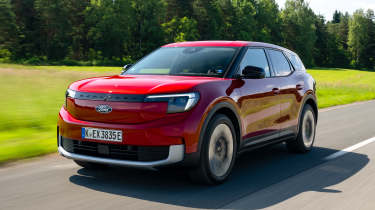
Ford’s relationship with Volkswagen dates back to the Ford Galaxy and VW Sharan MPVs, but this latest collaboration is arguably the most important yet. Using the VW Group’s MEB all-electric platform, the all-new Ford Explorer finally gives the blue oval a credible contender in the rapidly expanding mid-size EV market.
Unveiled last year, the Explorer was originally due on sale in autumn 2023, but sales and deliveries were delayed until summer 2024 due to a new UN regulation regarding standardisation of battery safety regulations. Speaking of which, the newcomer offers battery sizes between 55kWh to 82kWh, which results in a range of between 218 miles and 335 miles depending on the model.
The entry-level single-motor Explorer gets 168bhp, while there’s also a mid-range 282bhp option. Finally, there’s the dual-motor variant with 335bhp on tap – 40bhp more than the closely related VW ID.4 GTX.
Standard kit includes a heated steering wheel and massaging seats, climate control, keyless entry, and a 15-inch screen infotainment system with Apple CarPlay and Android Auto. In terms of practicality, there’s a decent-sized 450-litre boot, which is bigger than the brand’s Mustang Mach-E’s, but around 100 litres down on the ID.4’s.
Ford Capri
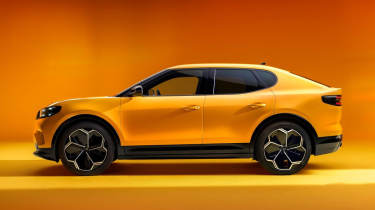
Cast your mind back to the original Ford Capri of the 1970s and 80s, with its mini muscle car looks and naturally-aspirated petrol engines, and forget everything – the new model couldn’t be more different. In line with changing customer tastes and ever-stricter legislation, the Capri has been reborn for the 21st century as an all-electric SUV, and it’ll be hitting our roads later this year.
The new Ford Capri is essentially a rebodied version of the Ford Explorer above, with the two cars sharing their electric platform, interior and even some exterior body panels. The Capri differs with its sloping rear roofline and lowered suspension, both contributing to its sportier appearance.
Prices start from around £48,000, although a cheaper model is due in the future with a less powerful motor and a shorter range. Fans of the original Capri sports car may see the revival of an iconic nameplate as nothing more than a marketing gimmick, but look past the name and the new EV could be one to watch in the growing coupe-SUV market.
MG HS
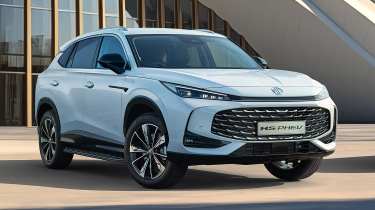
MG’s return to the UK has been nothing short of a huge success, with its range of affordable hybrids and EVs giving more established brands a run for their money. The new MG HS looks to continue that trend, packing a cutting-edge plug-in hybrid system into a completely revamped mid-size SUV body.
While that might not seem so exciting on the surface, where the MG HS stands apart is its price – the PHEV model will start from just £31,495, making it one of the most affordable SUVs with plug-in tech. Even better, MG claims it’ll be able to manage up to 75 miles of driving in pure-electric mode, outperforming the majority of PHEVs on sale today. An even more affordable pure-petrol model will also be offered, costing from around £25,000. No matter how you slice it, that looks like good value to us.
Based on the Roewe RX5, which first hit the Chinese market in 2022, the new MG HS is completely different to the outgoing model. It’ll still be the largest model in its lineup, but the interior looks to have moved on significantly in terms of tech and design, while the exterior has been sharpened up with styling akin to the MG3 supermini.
Skoda Kodiaq
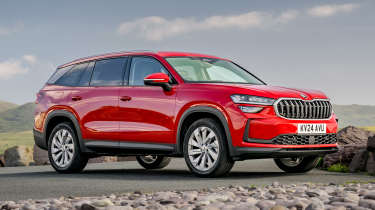
Skoda has turned into something of an SUV specialist in the last few years – and its flagship Kodiaq is one the best of a talented bunch. Boasting even more space than before, enhanced technology, a more luxurious finish and more efficient engines, the latest version of the seven-seat Skoda is likely to be one most eagerly anticipated arrivals of 2024.
With a generous 61mm increase in length over its predecessor, the Kodiaq is bigger than ever. Moreover, Skoda claims the extra inches have been added to the rear of the car, meaning more boot space plus greater legroom for those in the third-row seats. Elsewhere, the interior has clearly been influenced by the brand’s all-electric Enyaq, as it features big digital display screens, extensive leather trim inserts and a curated collection of materials and themes for buyers to choose from.
But one addition for the Kodiaq is a set of physical ‘Smart Dials’ on the centre console that can control various functions and settings depending on how you interact with them. The new dials have allowed Skoda to clean up the front cabin while retaining physical controls for key functions.
The second-generation Kodiaq’s engine range includes mild-hybrid petrol and regular diesel options plus, for the first time ever, a plug-in hybrid setup. The Kodiaq PHEV will offer a pure-electric driving range of more than 60 miles, meaning it should fall into the 8% Benefit-in-kind tax band for company-car drivers.
Ssangyong Torres EVX
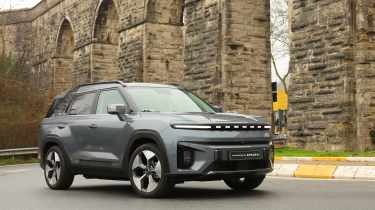
By the time the Torres EVX hits the market, it’ll be badged KGM rather than SsangYong, as the Korean firm undergoes a rebranding. But the company will still have the same mission, offering larger and better-equipped cars than you’d expect for the money, which in the Torres EVX’s case should be around £40,000.
For that, you’ll get a Skoda Enyaq rival with a fair bit more size and space – in fact, a lot more, with an enormous 839 litres of boot capacity. The company hasn’t revealed many details on the EVX’s performance or range, but in Korea, it’s supplied in a single 201bhp form with a 73.4kWh battery pack. A pick-up truck based on the same platform is also expected to arrive in 2024.
Subaru Forester
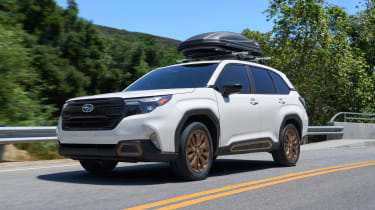
The Subaru Forester isn’t a common sight on UK roads but continues to delight its small and loyal band of owners, and that’s unlikely to change when the new model arrives. That includes sticking with a flat-four petrol engine and all-wheel drive – if you want an electric Subaru, the Solterra remains the only option.
The Forester’s styling is typically chunky but looks a lot more cohesive than the outgoing car. There are improvements inside too, including a 11.6-inch portrait touchscreen and the latest iteration of Subaru’s EyeSight driver assistance technology. Pricing should start at around the £40,000 mark, a couple of thousand more than the current car.
Volvo EX90
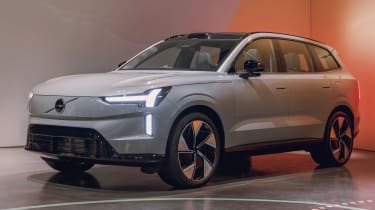
One of the best family SUVs is going all-electric in 2024, as the Volvo XC90 makes way for the EX90. The range will kick off with 402bhp and 510bhp dual-motor setups, meaning both are all-wheel drive, while a 107kWh battery pack should give both enough juice for around 360 miles of range. 250kW charging capability could enable a 10-80% top-up in half an hour if you can find a fast enough public charger.
In terms of design, the EX90 looks quite similar to the outgoing XC90, albeit with modernised styling cues and the notable absence of a grille. Inside, Volvo has gone minimalist, deleting almost all the buttons and switches you’d ordinarily find – it makes for a clean look, but as we found with the smaller EX30, not an entirely practical choice. This seven-seater won’t be cheap: expect a Range Rover-matching price tag of around £100,000.
Premium Cars
Buyers shopping at the pricier end of the car market will be spoiled for choice too. Manufacturers are gradually phasing out their traditional combustion-engined premium cars in favour of electric models, and we expect this trend to continue through 2024. If you’re looking for cutting-edge EV technology, then you should be getting excited about these upcoming premium cars.
Audi A6 e-tron
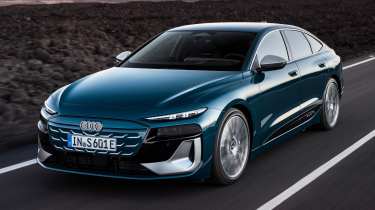
With both BMW and Mercedes-Benz fielding executive cars with electric power in the shape of the i5 and EQE, it’s no surprise to see Audi doing likewise with the A6 e-tron. Unveiled earlier this year, the A6 e-tron will be available in two forms, as a Sportback saloon (think along the lines of the existing A5 or A7 Sportbacks), and as an Avant estate car.
It’s similar under the skin to the Q6 e-tron below (and the new Porsche Macan EV), which means it packs a large 100kWh battery in top-spec models. That translates to a whopping 463 miles of range, partly thanks to its slippery, aerodynamic bodywork. Customers can place an order now, with prices starting from just under £70,000.
Audi Q6 e-tron
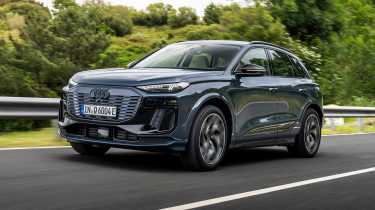
The Audi Q6 e-tron fits between the Q4 e-tron and Q8 e-tron in Audi’s range, and will go head to head in the market with the BMW iX. Audi has revealed the new car will offer 800-volt charging, capable of topping up the 100kWh battery pack from 10-80% in around half an hour – if you can find a charger powerful enough to meet that charging speed. With two motors for all-wheel drive, and power outputs of 396bhp up to 510bhp for the SQ6, it’s sure to be quick, and that large battery can deliver up to 380 miles on a charge.
Like the A6 e-tron, Audi will offer a pair of body styles, this time a practical conventional SUV shape and in sleeker Sportback form. The latter will arrive later next year, but customers can place an order now for the regular SUV model, with entry-level versions costing from around £60,000. All Q6 e-trons get a high-tech triple screen layout, comprising an 11.9-inch driver display, 14.5-inch central touchscreen, and a 10.9-inch passenger display, the latter actually able to play videos, with a privacy mode that should prevent the driver from watching along.
BMW X3
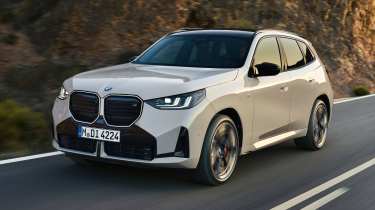
The original BMW X3 was one of the first to kickstart the premium mid-size SUV market, and the all-new model is set to carry the torch in 2024. Priced from around £47,000, the new X3 will compete with the likes of the Mercedes GLC and Jaguar F-Pace when it reaches dealerships in the latter half of the year.
BMW has treated the new X3 to a completely overhauled interior, pinching the design language and infotainment tech found in the new 5 Series. You get a pair of large curved digital displays above the dashboard, with ambient lighting throughout the cabin and a range of new upholstery options.
The exterior design is more evolution than revolution, but it takes a step closer towards the BMW Neue Klasse X concept that was unveiled earlier this year. It’s a similar story under the bonnet; BMW will continue to offer a range of petrol, diesel and plug-in hybrid engines to suit every buyer’s taste. Notably, however, the electric iX3 has been discontinued for this generation – it’s likely to be spun off into its own unique model based on the Neue Klasse X in the future.
Hyundai Ioniq 7
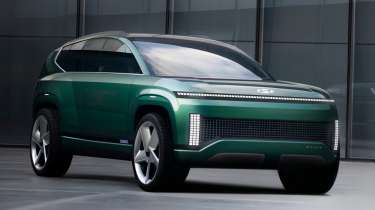
Hyundai has been on a roll in recent years. The Ioniq 5 hatchback and Ioniq 6 saloon cars have impressed us with their clever tech and quirky looks, and now the South Korean firm will be adding another electric arrow to their quiver, in the form of the Ioniq 7 SUV.
The Ioniq 7 will share its platform with the Kia EV9, another electric SUV that we reckon is the current seven-seater to beat. We expect it to feature the same 100kWh battery and it should be offered with a choice between a single motor or dual-motor four-wheel drive layout. In terms of its styling, the Ioniq 7 will share its boxy proportions with its Kia sibling, and it will wear a horizontal light bar across the front, as found on the Ioniq Concept Seven and the latest Hyundai Kona.
Polestar 3
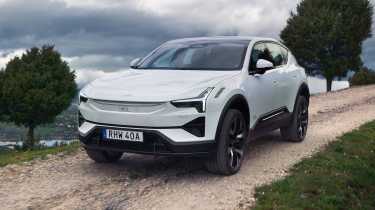
Sweden’s Polestar cars are arriving thick and fast in 2024, following a few years of letting the Polestar 2 settle into the market. While there’s some similarity underneath to the Volvo EX90, the Polestar 3 is less Volvo-like than the first couple of cars from the brand, and offers some impressive features (including a 25-speaker Bowers & Wilkins audio and a 14.9-inch touchscreen) for its starting price of just under £80,000.
It uses a twin motor setup, for all-wheel drive and a 482bhp output – good for 0-62mph in five seconds. A 510bhp Performance model will be quicker still, while a 107kWh battery pack offers a claimed 379-mile range. 250kW charging speeds promise a 10-80% top-up in only half an hour.
Polestar 4
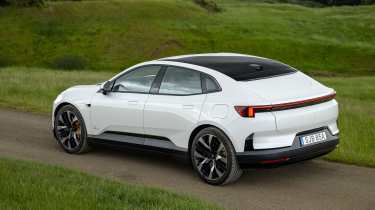
The Polestar 4’s styling should attract plenty of attention once it hits the road next spring, and it will no doubt leave a few passers-by wondering why it doesn’t have a rear window. Drivers will instead use cameras and side mirrors to see out the back, and Polestar claims abandoning the rear screen improves rear headroom – we didn’t find it too claustrophobic when we tested the rear seats during our in-depth review.
The car’s performance shouldn’t be in question though, with up to 537bhp from its dual-motor setup, and a 102kWh battery that, based on the taller 107kWh Polestar 3, should be enough for more than 350 miles of range. A 15.4-inch touchscreen dominates the dashboard, but it’ll be a lot more affordable than the Polestar 3, with a starting price of around £55,000.
Porsche Macan EV
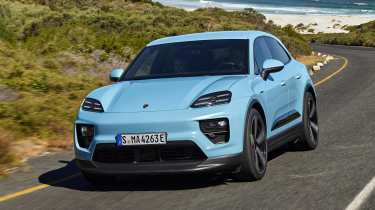
The Porsche Macan has been an enormous success for the German sports car brand – it’s second only to the larger Cayenne in Porsche’s global sales figures. Demand is sure to continue with the all-electric Macan EV, which should combine the Macan’s appeal with the performance of the brand’s first electric car, the Taycan.
The new Macan will share its platform with the new Audi Q6 e-tron, but expect the Porsche to deliver its maker’s usual driving characteristics, as it’ll include the latest version of Porsche Active Suspension Management, and torque vectoring for its electric motors. Two versions will be offered at launch, a regular Macan and a Macan Turbo, the latter with as much as 600bhp. Range from the 100kWh battery pack is said to be good for nearly 400 miles.
Range Rover EV
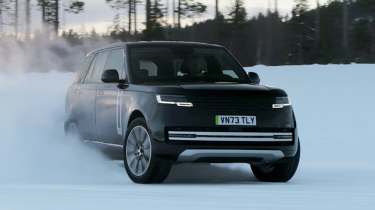
The Rolls-Royce Spectre and BMW i7 have shown that nothing quite beats electric power for true luxury, and Jaguar Land Rover knew that when developing the current fifth-generation Range Rover, because it was prepared for EV power from the start. That model will arrive in 2024, ready to compete in an increasingly electrified luxury car market.
Details are thin on the ground, but insiders suggest the Range Rover can accommodate a battery pack of around 100kWh – on par with several other large EVs. The car’s size and weight will no doubt limit range, but something in the region of 300 miles is feasible. EV power shouldn’t harm the Range Rover’s off-road ability, but it’s sure to make it popular in London’s ULEZ, too…
Toyota Land Cruiser

The chunky new Toyota Land Cruiser is sure to be one of 2024’s most distinctive new cars, with styling harking back to some of the earliest Land Cruiser models – a heritage that goes back more than 70 years. The last few generations of Land Cruiser have been as tough and reliable as ever, but now it has style on its side.
Off-road ability remains important, so Toyota has worked hard to trim the Land Cruiser’s overhangs (that’s the amount the bumpers extend beyond the front and rear wheels, which is crucial to clearing obstacles) to a minimum. Unlike the other upcoming cars in this segment, the new Land Cruiser is not an EV – The 4x4 will launch with a 201bhp, 2.8-litre turbodiesel engine, with a mild hybrid model joining in 2025. It won’t be cheap, however – prices start from £75,000.
Performance cars
It may be a niche market, but manufacturers aren’t giving up on the performance car for 2024. In fact, we’re beginning to see more dedicated electric sports cars than ever before, with several new models reaching our roads in the coming year. It will be interesting to see how these high-voltage speed machines stack up against the petrol-powered establishment.
BMW M5
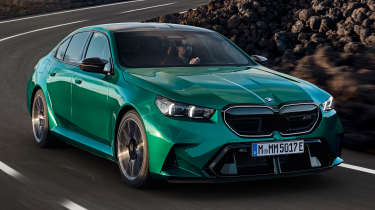
With the new BMW 5 Series and i5 already in the hands of customers, it wasn’t going to be long before BMW unveiled the new M5, the high-performance variant of its executive saloon. Revealed in June 2024, the ‘G90’ M5 is the most powerful version to date, thanks to its 717bhp plug-in hybrid V8 – a first for the M5.
It gets a cartoonish styling overhaul to match that lofty power figure, with a set of bulbous wheel arches, gaping front air intakes and quad exhaust pipes. The interior is largely unchanged from the standard car, although there are some small ‘M’ design touches dotted throughout. Performance remains the M5’s core purpose, however, and there’s plenty of it; 0-62mph is achieved in 3.5 seconds and it’ll carry on all the way to 189mph if you pay for the M Driver’s package.
Interestingly, both of those figures are slightly down on the old car, despite the uplift in horsepower. This is probably due to the added weight of the plug-in hybrid system, although you do get a 43-mile electric driving range as recompense.
Cupra Tavascan
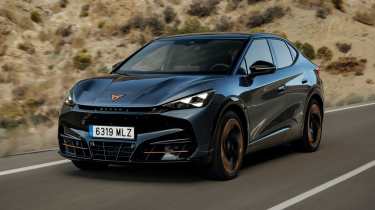
Cupra has quickly cultivated an image of exciting styling and fun driving characteristics since its break from SEAT, and with the Tavascan, Cupra’s equivalent to the Volkswagen ID.4 and Skoda Enyaq, that looks set to continue. It has sharper styling than either of its cousins, and takes several of its styling cues from the identically-named concept that appeared at the 2019 Geneva Motor Show.
On sale now, customers can choose between two models, a 282bhp rear-motor model, and a 335bhp, 679Nm dual-motor variant. There’s a driver-focused cabin design, complete with the usual copper-coloured accents and a 15-inch touchscreen, with sporty bucket seats as standard. It should certainly give the Kia EV6 and Nissan Ariya something to think about.
Ford Mustang
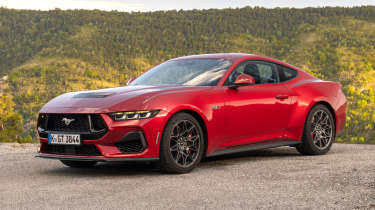
A new Ford Mustang doesn’t come around very often. The last one arrived in 2015, and that was the first that UK buyers had been able to buy in right-hand drive. The new Mustang is already available to customers in its home market, and should appear in Europe in 2024, complete with an old-school driving experience that’s becoming increasingly rare.
The Mustang gets a 5.0-litre, naturally-aspirated V8 petrol engine producing 450bhp, and just like the outgoing car, two gearbox choices will be available: a six-speed manual, and a 10-speed automatic. A track-focused Dark Horse model adds extra chassis bracing, high-performance Brembo brakes, and extra oil coolers to handle faster driving.
MG Cyberster
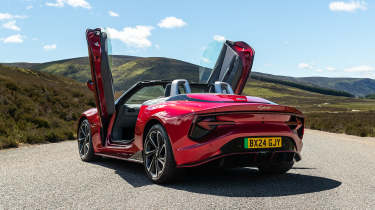
It’s been a while since we’ve seen an MG badge on a sports car – the last TF roadsters built at the old Longbridge factory in the UK emerged in 2011. Since then, MG has focused on worthy but mostly dull family cars, until summer 2024 when the sleek, Chinese-built Cyberster arrived.
This electric roadster offers 309bhp rear-motor and 536bhp dual-motor variants, the latter going from 0-62mph in 3.2 seconds – a lot quicker than the old TF. It’s capable of travelling up to 316 miles on a charge, so despite having just two doors, it’s not entirely impractical. Costing from £55,000 for the single-motor model, or £60,000 for the faster dual-motor car, it’s certainly a lot more expensive than those old MG sports cars. But for well-heeled roadster enthusiasts who want to go electric, it’s one of the only options.
To find out which cars impressed us the most heading into 2024, read our 2024 Carbuyer Car of the Year winners...
Recommended

New Alpine A390 performance SUV put through its paces in Arctic testing
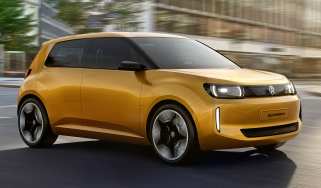
New Volkswagen ID.Every1 previews the affordable electric future of VW
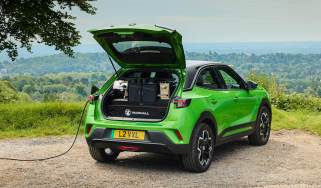
Vauxhall Mokka Coffe-e puts the EV in beverage with onboard espresso machine
Most Popular
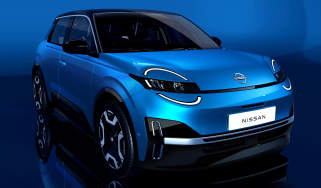
New Nissan Micra is a Renault 5 in Nissan clothing
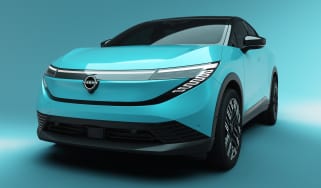
New Nissan Leaf is here! Groundbreaking EV has morphed into an SUV
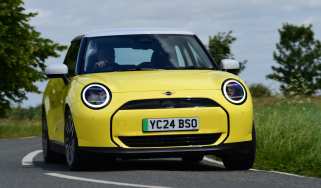
Best car leasing deals 2025: this week’s top PCH offers
Tips & advice

Car dashboard warning lights: what does each symbol mean?

Electric car charging stations: public networks, charger types, apps and maps





